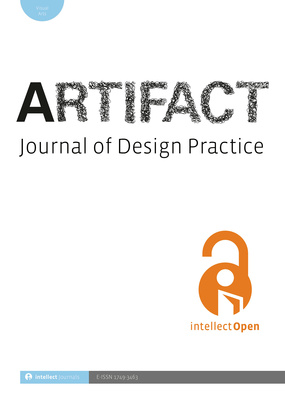
Artifact: Journal of Design Practise 5.2 is now available on IngentaConnect open access!
Artifact: Journal of Design Practise 5.2 is now available on IngentaConnect open access!
Click here to download articles >> https://www.ingentaconnect.
Issue 5.2
Editorial
Author: Nedergaard, Nicky
Articles
Theory as habitus for scholarly design research
Author: Pizzocaro, Silvia
Higher education in design, scholarly research and design research need to be continuously clarified in relation to evolving concepts such as knowledge, theory and practice. Being awarded a Ph.D. in design about 25 years ago, when scholarly research in design was in its infancy, and working with students in master and Ph.D. programmes in design for more than two decades, I share with the reader what I keep on learning in this educational milieu. It is my own perspective, based either on past experience or on the ongoing perception of local concerns. More broadly, a number of underlying general issues are reported to highlight the spread of design research practice encompassing aspects such as theory as a practice; the lack of fully consolidated design research frameworks where design paradigms may be embedded; and the need to nurture and strengthen the process of theory-making in design doctorates. What it is finally claimed is the advantage of theory as formae mentis, intended as a habitus for design research learners. While education in design often collectively addresses the professions of design, architecture and engineering, the following reflections will mainly address the manifold domains of industrial design, intended as a comprehensive term for either tangible or intangible design domains, intersecting product, graphic, communication, visual and interaction design fields.
Authors: Lee, Soyeon; Self, James A.
A product’s form and related affordances, together with interaction possibilities, have a significant influence on the user’s emotional response. Although interaction influences the user’s product experience, little is known of how product interaction may best provide opportunities for novel yet understandably familiar product-user experiences. The purpose of this study is to contribute to understanding the contradictory relationship between novelty and acceptability in product design, with a focus on product interaction. Adopting a research-through-design approach, four bottle designs were developed and prototyped. Two dichotomous theoretical constructs were applied to the four designs: Explanatory-Affordance, Exploratory-Affordance, Explanatory-DisAffordance and Exploratory-DisAffordance-
Authors: Pinski, Jenny; Kane, Faith; Evans, Mark
The industrial revolution created a rise in mass manufacture, increasing consumption to current unsustainable levels and marking a decline in hands-on craft practice. In contemporary practice, designers frequently employ digital ways of working and, whilst this may create opportunities and efficiencies, it can limit the working of materials by hand. In contrast, hands-on craft processes can develop in-depth knowledge and understanding to help solve complex and novel design problems. With increasing use of digital design methods, it is timely to reflect on the role and value of hands-on craft practices. The study explores the use of craft-based approaches to support design practice in relation to novelty and quality and considers its future potential to contribute towards design for sustainability. A design project that integrated hand weaving with sandal design was undertaken and qualitative data were collected. This was analysed through data reduction, coding, clustering and display and is presented as a case study. The findings indicate that a craft-based approach can contribute to a heightened control of materials, construction and awareness of wider design issues such as the development process, production methods and environmental impact. Difficulties were identified in inefficient use of time and a knowledge/skills gap between specialist design and craft disciplines.
For more information about the journal and calls for papers, click here >> https://www.intellectbooks.

